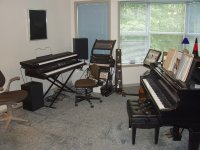Walker
🪗
I think Tom has made an excellent point - have some fun, play the stradella accordion for a while and when you are ready, think about the free bass accordion or keyboard... whatever you prefer.
You know, not everyone wants or needs to play free bass. Some people think it's an utter waste of time because it's not "traditional" and all you really need is just a bit of "oom pah" to bulk-out the tunes. That's okay.
Also, some of the most vociferous critics of free bass are other free bass accordionists who play a different system... who will happily tell you to your face, in a nice (ish) way, that the system you play is a waste of time... not enough notes, wrong layout or type of keyboard etc. That's okay too! However, what really matters is if you can think the process through for yourself and come to a solid conclusion that makes sense to you. I sense @Jaime_Dergut you might not quite be there yet.
who will happily tell you to your face, in a nice (ish) way, that the system you play is a waste of time... not enough notes, wrong layout or type of keyboard etc. That's okay too! However, what really matters is if you can think the process through for yourself and come to a solid conclusion that makes sense to you. I sense @Jaime_Dergut you might not quite be there yet.
For me, I played stradella bass accordion for 30 years before I started teaching myself free bass during Covid, and I chose a small Quint converter (PA) because I wanted a system to build on my stradella skills and I had zero interest in learning new systems from scratch. Plus the type of music I wanted to play (composing/arranging new music with a Celtic flavour, and also playing some Western Renaissance, Baroque, Romantic Era music) was entirely feasible on the instrument I chose. I don't have an extended 47 key PA or 5 octave of free bass - but those things were (and remain) unimportant to me.
All I'm saying is discover what actually matters to you and work from there. No rush.
You know, not everyone wants or needs to play free bass. Some people think it's an utter waste of time because it's not "traditional" and all you really need is just a bit of "oom pah" to bulk-out the tunes. That's okay.
Also, some of the most vociferous critics of free bass are other free bass accordionists who play a different system...
For me, I played stradella bass accordion for 30 years before I started teaching myself free bass during Covid, and I chose a small Quint converter (PA) because I wanted a system to build on my stradella skills and I had zero interest in learning new systems from scratch. Plus the type of music I wanted to play (composing/arranging new music with a Celtic flavour, and also playing some Western Renaissance, Baroque, Romantic Era music) was entirely feasible on the instrument I chose. I don't have an extended 47 key PA or 5 octave of free bass - but those things were (and remain) unimportant to me.
All I'm saying is discover what actually matters to you and work from there. No rush.
Last edited:

